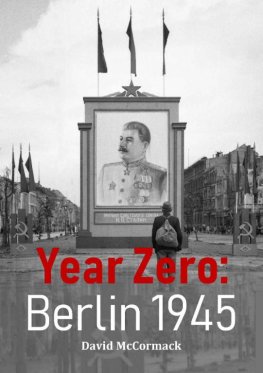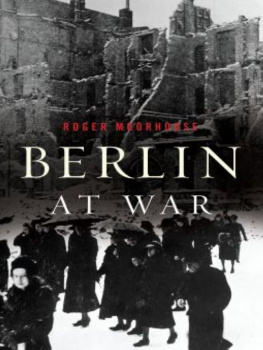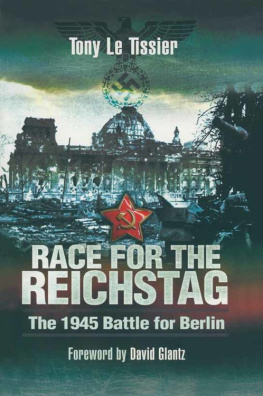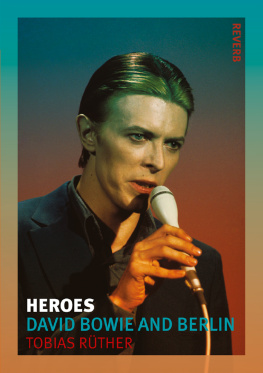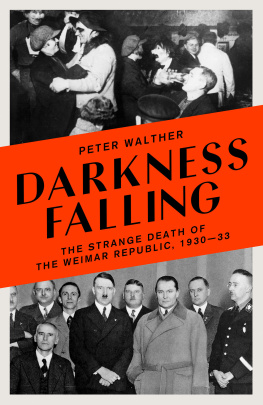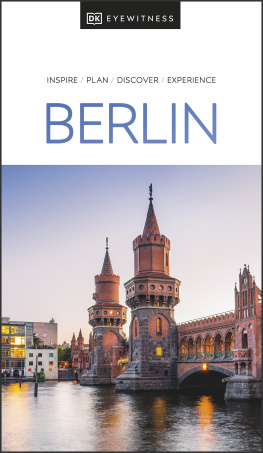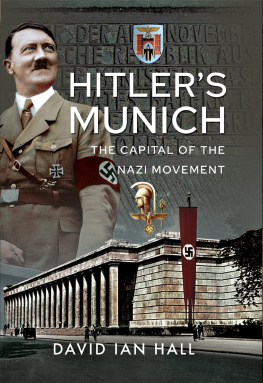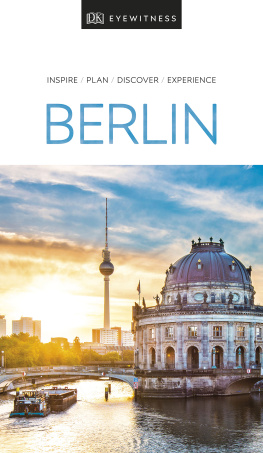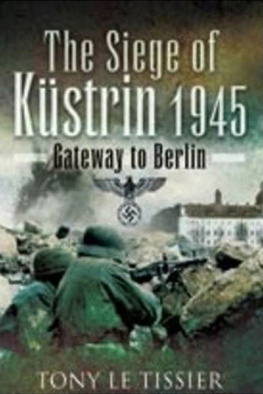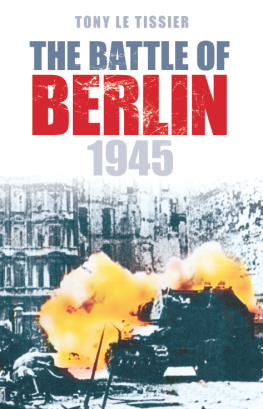David McCormack
YEAR ZERO: BERLIN 1945
Christmas has always been a magical time in Germany, even in Hitlers atheistic state the yuletide season was celebrated (albeit in a modified form). By 1944, the focus on civil celebrations had shifted towards a commemoration of the nations war dead. That year, there was little to celebrate. In Berlin, people continued about their daily business, drawn and haggard from the relentless Allied bombing which had reduced much of their city to rubble. Food was in short supply. The public had been subject to strict rationing from the very beginning, all but the privileged few living on a monotonous starch based diet. For many, the traditional Christmas goose was a faraway memory.
The irrepressible wit of ordinary Berliners was expressed in its darkest form during the winter of 1944. The most common jokes doing the rounds were, Be practical: Give a coffin, Enjoy the war while it lasts, the peace will be terrible, and a prescient quip based around the initials for air raid shelters (LSR Luftschutzraum) which became (LSR Learnt Schnell Russisch) Learn Russian Quickly. Fear of invasion by the barbarian hordes from the east resulted in an atmosphere in which the individual consciousness began to reassert itself. People began to care for each other again, as the traditional greeting of Heil Hitler gave way to the more solicitous Survive.
That Christmas, many wondered if it would be their last. They were fearful and uncertain. The world as they knew it, was about to come tumbling down. Their leaders had nothing to offer but more blood, more sacrifice. The enemy was at the gates. Berlin schoolgirl Ilse Shaffer reflected on the dark times which lay ahead:
Would there really be Christmas again? Was this the time to celebrate? Where did all the people live that one saw on the streets, the overcrowded streetcars and buses? Our army in the east has been defeated. The Russians are in East Prussia and the Allies are getting close to our western border. We can no longer trust the news, but we know that the end is not too far away This is the sixth Christmas since the war began, and still no peace. Where is God in all the destruction, the dying, the bombings? We saw the first refugees from the east, pulling on little carts with their few possessions, walking in this cold winter, walking, walking, telling us horror stories of murders and rapes by Russian soldiers What would the next months bring? The bombing has not stopped; it just gets worse, day and night, day and night.
There are no lights in the streets, not many goods on the shelves, only at night is the sky lit up by the Christmas Trees that come down from heaven If those bright lights shone over us, we knew that we were the target of their bombs Mary and Joseph, tired and hungry, could not find a place to stay so many peoples homes have been bombed, they have no place to live The baby Jesus had no bed, he slept on a manger our soldiers sleep on the floor, on straw Mary, Joseph and the baby Jesus had to leave in a hurry, fleeing Herod whole families: we saw grandparents, mothers and children, fleeing from home. Christmas has taken on a new meaning.
As well as the refugees flooding into Berlin, this young schoolgirl also witnessed the call-up of young boys and old men to defend Hitlers crumbling Reich. Any other nation would have long since accepted terms, no matter how harsh. Hitler was incapable of doing so, as an absolutist, he was only interested in victory. If the German people failed to give him that victory, they would go down with him.
Hitlers hubristic approach to his role as warlord produced an apocalyptic clash with the steelily determined Stalin. The Generalissimo was prepared to take the lair of the fascist beast at any cost. By 1944, the forces at his command were both enormous and highly capable. The three fronts available for the Berlin Strategic Operation boasted a combined troop strength of 2,500,000 men, 6,250 tanks and self-propelled guns, 41,600 artillery pieces, 1000 rocket launchers, and 7,500 aircraft. The opposing German forces defending the eastern approaches to Berlin were constantly overestimated by the Soviet High Command. However, the erroneous assumption that German units were fully manned and equipped later served to enhance the prestige of the Soviet forces involved.
Stalins motives for taking Berlin before the Allies were in part political as it was a prestigious prize. He was further motivated by the prospect of seizing materials from the nuclear research facility in Berlin-Dahlem. The Cold War was already in its infancy as the cracks that had been papered over in the name of wartime cooperation began to appear again. Thanks to his spy network, Stalin was well briefed about the Anglo American nuclear weapons programme. However, it came as something of a shock when a weapon was actually deployed against Japan. From this point on, the Cold War rapidly intensified. By the autumn of 1945, the Grand Alliance was all but finished. Roosevelt was dead, Churchill had been voted out of office. Only Stalin remained of the original Big Three. Berlin quickly became the focus of an ideological struggle between the superpowers.
In 1910, the German art critic Karl Scheffler wrote, Berlin is a city condemned to becoming and never to being, Never did his words appear so apposite as they did in the second half of 1945. Berlin was a city of ruins, a lunar landscape created by years of Allied bombing and the more recent Soviet bombardments. It was a tabula rasa on which the occupying powers could imprint their own culture and ideology. However, no matter what the occupying authorities did to restructure their own sectors, Berlin would always be Berlin.
Chapter One
The Good German Fritz Elsas
By 1945, it was clear to all but the most die-hard supporters of the Nazi regime that the war was lost. Hitler had become a distant figure, all but invisible to the masses. The void was filled by his propaganda chief, Joseph Goebbels, whose dire warnings of retribution ensured that the majority of the population continued to acquiesce in the less savoury aspects of the regime. Despite this, there were those who remained opposed to the Nazi states regimentation of society and the genocidal policies carried out in their name. Their resistance was largely uncoordinated and manifested itself through various means, ranging from non-compliance to assassination attempts.
Any resistance against Hitlers regime required an enormous amount of courage and determination on an individual level. The penalties for active resistance had from the beginning been most severe. Until 1943, the scope for resistance activities was limited, as the regime ruled with the consent of the majority of Germans. The catastrophic defeat at Stalingrad changed everything. Following this psychological turning point in the conduct of the war, the state focused the terror apparatus of the Gestapo and SS against asocial and subversive elements amongst the German people. Neither social position, nor previous service to the state provided immunity from a despotic tyranny which gave no quarter to either real or perceived enemies of the state. The failed attempt to assassinate Hitler at his East Prussian headquarters in July 1944 unleashed a furious response from the authorities in the form of mass arrests, show-trials and executions. The repression which followed broke the power of the Prussian military aristocracy for good and shattered what few remnants of political opposition were left. Amongst those who paid the ultimate price for their resistance activities was former Deputy Mayor of Berlin, Fritz Julius Elsas.
Elsas had been a dedicated servant of the Wilhelmine and Weimar states. Along with millions of other loyal Germans, he had volunteered for service with the army in 1914, however he was rejected because of his poor eyesight. Notwithstanding this setback, Elsas went on to serve his country with distinction whilst working for the Chamber of Commerce in Stuttgart. His greatest achievement was in designing a system of food supply which was later adopted throughout Germany. In 1919, Elsas joined the German Democratic Party which subsequently led to his appointment as a city councillor in Stuttgart. His political career suffered a setback in 1921 following a series of anti-Semitic attacks which forced him to withdraw his candidacy in the mayoral elections. Three years later, he effectively succeeded in resurrecting his moribund political career following an appointment to the state parliament of Wurttemberg. In 1926, Elsas moved to Berlin after taking up the vice-presidency of the German Cities Association.

